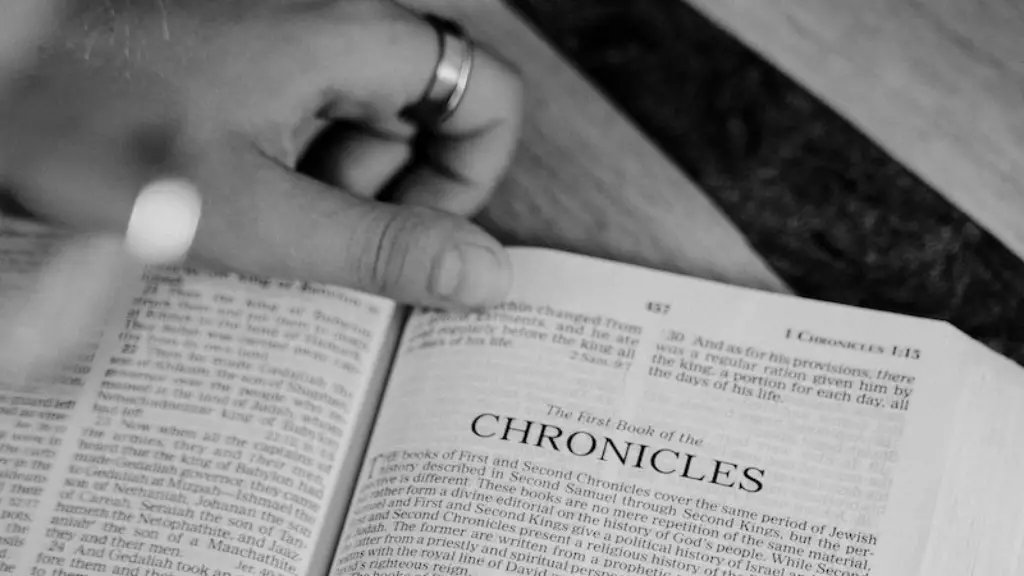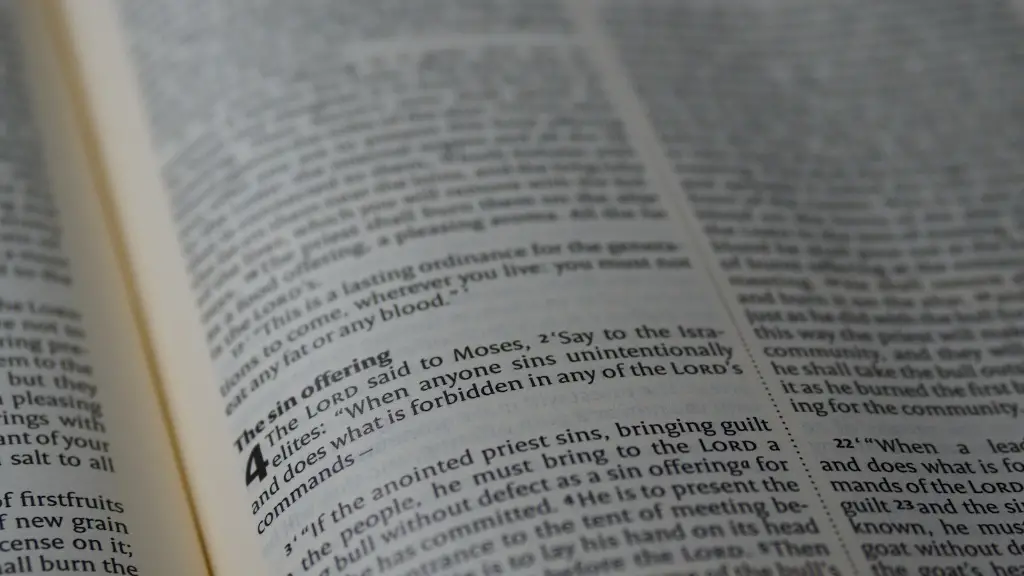What Does Woe Mean in the Bible
In the Bible, the word ‘woe’ is used to convey judgement, sorrow, distress, and lamentation. It is a strong expression of feeling and is often used in times of despair, suffering, anguish, and despair. The term is used to refer to a specific event or situation, or to symbolically represent a period of despair in general.
In the Hebrew Bible, the word is associated with many different kinds of affliction and destruction. It is seen in contexts relating to punitive damages, payment of restitution, physical suffering, and destruction. In the New Testament, it is used to express sorrow, mourning, and sympathy for those who are suffering from physical, emotional, and spiritual agony.
The words of Jesus, who is widely regarded as the ultimate source of truth, provide an example for understanding woe in a biblical context. In the Sermon on the Mount, Jesus said: “Blessed are those who mourn, for they shall be comforted” (Matthew 5:4). This passage speaks of the comfort that will come from those who mourn and carries with it the deeper spiritual understanding that there is a deeper, spiritual sorrow which accompanies our physical suffering.
In the Old Testament, woe is used not only as a cry of distress but also as a warning to nations, cities and individuals. In Isaiah 5:8, God declares “Woe to those who join house to house and lay field to field”. The purpose of this warning is to urge the people of Israel to be mindful of their actions and to remember to act according to God’s will. It serves as a reminder to the people that God is looking out for their welfare, and He will not tolerate their disobedience.
The Bible also takes a broader, more universal tone in addressing woe. This is seen in prophecies such as those in Isaiah 13:6-9, where God declares “Woe to the inhabitants of the earth.” This declaration of woe is a judgement that is meant to remind humanity of the consequences of their wickedness and disobedience. It serves as a reminder from God that He is the righteous Judge and that He will not leave the wicked unpunished.
In various passages throughout the Bible, woe is linked to pride and arrogance. Proverbs 6:17 says: “A proud look, a lying tongue, hands that shed innocent blood, an heart that devises wicked imaginations, feet that be swift in running to mischief, a false witness that speaks lies, and he that sows discord among brethren”. This passage serves as a warning to not allow pride and arrogance to override our moral judgement and compassion.
Woe as a Warning of Spiritual Consequences
In the Gospels, woe is used as a warning of spiritual consequences for those who do not heed God’s warnings. Matthew 11:21-23 states: “Woe unto thee, Chorazin! Woe unto thee, Bethsaida! For if the mighty works that were done in you had been done in Tyre and Sidon, they would have repented long ago in sackcloth and ashes. But I say unto you it shall be more tolerable for Tyre and Sidon in the day of judgement than for you.” This passage serves as a warning of the spiritual consequences that will befall those who do not follow God’s will.
In the book of Revelation, woe takes on a more apocalyptic tone. It serves as a warning to those who reject God or refuse to repent. In Revelation 8:13, God declares: “Woe, woe, woe to the inhabiters of the earth.” In this passage, God is warning humanity that a time of judgement and destruction is coming if they do not repent and turn back to Him. This is a reminder that God is a righteous judge and that He will not tolerate those who persistently reject Him and His will.
In other passages, the term is used more generally to express sorrow and lamentation. In the book of Jeremiah, God declares “Oh, that my head were waters, and mine eyes a fountain of tears, that I might weep day and night for all the slain of the daughter of my people” (Jeremiah 9:1). In this passage, God is expressing His deep sadness over the destruction and death that has befallen His people.
Woe as a Call to Repentance
In the New Testament, woe is used as a call to repentance. In the Gospels, Jesus gave several warnings to show the spiritual danger of not heeding God’s warnings. In Luke 13:3-5, Jesus said: “I tell you, nay: but, except ye repent, ye shall all likewise perish. Or those eighteen, upon whom the tower in Siloam fell, and slew them, think ye that they were sinners above all men that dwelt in Jerusalem? I tell you, nay: but, except ye repent, ye shall all likewise perish.” In this passage, Jesus is warning the people to repent or else they will suffer the same fate as the people who were killed when the tower fell.
In the book of Revelation, woe is used as a warning of God’s judgment that will come if people do not repent and turn back to Him. In Revelation 11:14, Jesus declares: “The second woe is past; and, behold, the third woe cometh quickly.” This is a warning that Jesus is coming to judge the earth and those who do not repent must prepare themselves for what is to come.
In the Bible, woe is used to represent judgment, warning, and sorrow. In various contexts, it serves as a reminder of the consequences of people’s actions and rebellion against God. It is also used to express empathy and understanding for those who are suffering. No matter the context, the message remains that of repentance and turn back to God, or suffer the consequences.
Woe, a Source of Comfort and Hope
Although the term ‘woe’ often carries an ominous tone, it also carries a source of comfort and hope. In the book of Lamentations, the prophet Jeremiah expresses grief and despair over the destruction of Jerusalem by the Babylonians. Yet even in the midst of this grief and despair, Jeremiah finds hope in God’s promises of restoration. As he laments the destruction of Jerusalem, he also looks to the future and declares: “The LORD will be a refuge for the oppressed, a refuge in times of trouble” (Lamentations 3:57). In this passage, Jeremiah recognizes that God will be a source of comfort and hope in the midst of suffering and despair.
The book of Revelation also speaks of hope in the midst of despair. In Revelation 21:4, God declares: “He will wipe every tear from their eyes. Death shall be no more, neither shall there be mourning, nor crying, nor pain anymore, for the former things have passed away.” This promise of comfort and hope shows that even in the midst of despair, God is still working to bring restoration and healing.
The message of woe in the Bible is one of hope and comfort even in the midst of despair and destruction. It serves as a reminder that God is a righteous judge, and while He will not tolerate wickedness and disobedience, He also recognizes the suffering of His people and comforts them in the midst of their distress.
The Redemptive Power of Woe
The concept of woe is central to the notion of redemption and salvation. In the book of Romans, Paul wrote about the power of redemption. He states: “For in hope we were saved. Now hope that is seen is not hope. For who hopes for what is seen? But if we hope for what we do not see, we wait for it with patience” (Romans 8:24-25). This passage speaks of the power of hope to sustain us in the midst of suffering, and it serves as a reminder of God’s redemptive power.
The concept of woe is also a reminder of the transforming power of grace. Paul writes in the book of Ephesians: “Be kind to one another, tenderhearted, forgiving one another, as God in Christ forgave you. And be kind to one another, tenderhearted, forgiving even as God for Christ’s sake has forgiven you” (Ephesians 4:32-33). This reminder of grace and forgiveness speaks of the power of redemption to transform lives, even in the midst of suffering and despair.
In many passages throughout the Bible, the power of God’s mercy, grace, and redemption is emphasized. The concept of woe serves as a reminder of this power, and the promise of hope and comfort even in the midst of despair and destruction.
Biblical Examples of Woe
Throughout the Bible, there are examples of how woe was addressed and how it serves as a warning of God’s judgement. In Genesis 4:11-12, God confronts Cain after he has killed his brother Abel. God warns Cain of the consequences of his actions and says: “And now you are cursed from the ground, which has opened its mouth to receive your brother’s blood from your hand. When you till the ground, it shall no longer yield its strength to you. A fugitive and a wanderer you shall be on the earth.” The warning to Cain is a reminder of the consequences of rejecting God’s will.
In the book of Numbers, Aaron and Miriam were struck with leprosy for their pride and arrogance. After realizing their sin, Aaron said to Moses “Alas, my lord, I beg you, lay not the sin upon us” (Numbers 12:11). The use of the term ‘alas’ is indicative of the sorrow and regret that Aaron and Miriam felt for their sin.
In the book of Samuel, King David mourns the death of Saul and Jonathan. In 2 Samuel 1:23, David proclaims “Saul and Jonathan, beloved and pleasant in their lives, and in their death they were not divided.” This passage serves as a reminder of the sorrow and despair that comes with the death of loved ones.
In the book of Lamentations, the prophet Jeremiah mourns the destruction of Jerusalem. “How lonely sits the city that was full of people!” (Lamentations 1:1) he declares. His sorrow is representative of the feelings of loss and despair that the people of Jerusalem were experiencing at the time.
Conclusion
In the Bible, the term ‘woe’ is used to convey judgement, sorrow, distress, and lamentation. It is used to represent various forms of suffering, judgement, and warning for those who do not obey God’s will.





